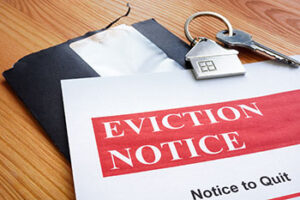
While a specific landlord’s options are always limited by the specific facts of the situation and the terms of the lease, landlords that find themselves in situations in which they need to evict one or more unauthorized tenants typically find they do not have free reign to do so. What are a landlord’s options in this situation?
Unapproved Roommates Squeeze In
Many landlords have found themselves in a situation like the following:
A tenant signs a lease for a residential property. Either at the lease signing or shortly thereafter, the tenant announces that he or she plans to have a roommate move in. The landlord, who is busy, thinks little of the announcement except to file it away for future reference. The new roommate or roommates move in without signing the lease, and after some time, the original tenant moves out and replaces himself with another person – all without getting a formal “okay” from the landlord.
Soon after the original tenant leaves, the landlord begins receiving complaints from neighbors about noise, traffic, and other problems. The landlord would like to get rid of the now-entirely-unauthorized tenants – but what can the landlord do within the bounds of the law?
Here are 3 steps on what landlords can do to get rid of unapproved roommates:
Step #1. Give Notice
If the lease contains a specific notice provision, the landlord should act on it as soon as possible by giving notice to the current tenants that they will have to move out of the premises. In many situations, notice may be a sufficient remedy, especially if the tenants are not causing damage to the property or there have been few or no complaints about their behavior.
If the lease has no notice provision, the landlord may have to give notice according to the laws of the state in which the property is located. In these situations, notice may be the length of a rent-payment period or longer. If the rent period is relatively short – a month or less – this notice may be adequate for the landlord’s needs; otherwise, other remedies may need to be pursued.
Step #2. Pursue Eviction

The landlord may have the opportunity to pursue an eviction on the basis that there are unapproved tenants living in the unit, if the lease allows for eviction on this basis. If the lease does not currently contain such a clause, however, the landlord may have no such option. The landlord may also be out of luck if a court finds that the landlord has waived the clause through prior inaction – such as by allowing unapproved tenants to live on the property in the past.
Step #3. Call the Police
Law enforcement involvement is not appropriate in all situations. If the tenants are merely unapproved but are engaged in no active wrongdoing, the police should not be considered an option. However, if a landlord has good reason to believe the tenants are involved in criminal behavior, such as drug use or trafficking, the smart landlord should strongly consider getting the police involved. If criminal activity is occurring, the landlord may have the right to pursue an expedited eviction of the tenants – whether or not they are unapproved.
Note: This article is provided for informational purposes only. No information provided in this article should be considered legal advice. If you have legal questions, please consult an attorney who is licensed to practice law in your area.
Have you encountered unapproved roommates in your rental units? How did you handle it? Please share this article and let us know what happened and how you handled it in the comments section below.

